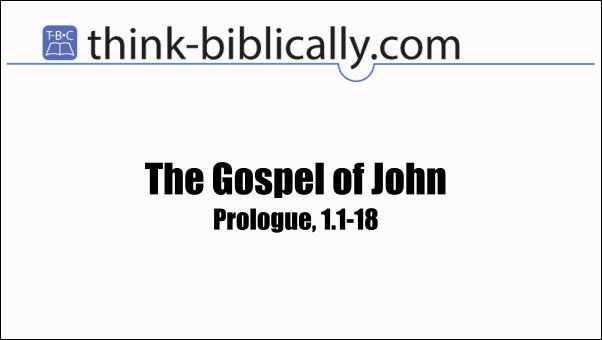By Tyson Thorne

The most famous opening lines of any piece of literature of any age are those of Genesis, "In the beginning..." It's fame is attributed not to its ancient origins or to its religious importance, but to its addressing an issue that all people wonder about. How did all this begin? Greek philosophy started because they wanted to know what was the first substance, the thing from which everything came from. To this day the question remains. Those who reject God believe in a primordial soup from which everything came from, with no idea of what its ingredients are. Origins is the ultimate investigation.
Genesis goes beyond asking the question, however, and answers it with a single word: "God". "In the beginning, God..." The author of Genesis tells us that God is the one from whom all things came. He is Creator, owner of all that is, and one who interacts with his creation. The opening line of Genesis is a philosophical maelstrom, answering the greatest questions of humanity and defining God as a person who seeks relationships with the person's he created.
While the other Gospel writers show Jesus is the Messiah by recording his lineage and birth narrative, John goes back to creation and shows that Jesus is the same Creator Moses wrote about thousands of years earlier. He too begins his writing with "In the beginning..." but rather than using the name of God he describes the Creator as the "Word." "In the beginning the Word..." John continues to draw from Genesis chapter one, identifying God as Creator, owner and interacting with his creation but in doing so tells us that Jesus is that Creator. He is equal to God, but not God, as is made clear when he claims "and the Word was with God".
There are other parallels as well, such as the subjects of darkness, light and life. These parallels are not by accident. While Genesis describes the original creation account — of both the physical and spiritual worlds — John describes a re-creation account. In the first, the physical world was created, then the spiritual. In the recreation, the spiritual comes first then the physical. For example, every time John uses the Greek word zoa, which can mean either physical or eternal life, he uses it to mean "eternal life" — and not just in his Gospel, but in all three of his letters as well. We'll discuss this and the other parallels in more detail as we work through the book.
In verse six we are introduced to John the Baptist, a prophet sent to testify that Jesus is the Messiah, the Light of the World, whose mission was to raise "children of God". John is very specific about this phrase, that God's children are not born physically but spiritually and by God's will. Then in verse six we move from the Word being with God to the incarnation. Here again John is very careful to differentiate between Jesus and the Father, equating Godhood to both but separating them in person-hood. Another distinction he draws is between the Law, given by Moses, and grace and truth, given by the Messiah. Unlike the Law, which was given once, Jesus provided grace and truth like a gift, given "one after another". This gift of grace and truth results in eternal life. With this final testimony John begins the Gospel story.
